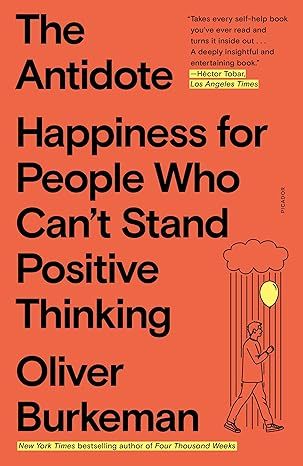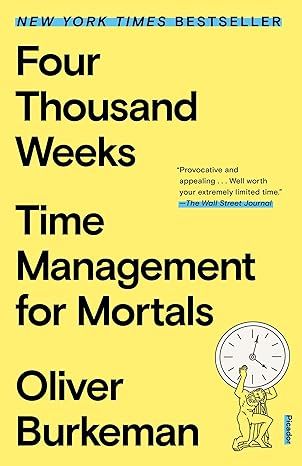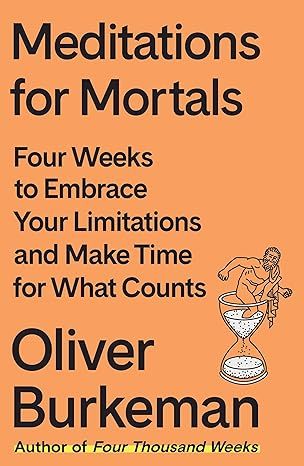Antidote
4.5 out of 5
2,825 global ratings
From the author of the New York Times -bestselling Four Thousand Weeks , a totally original approach to self-help: success through failure, calm through embracing anxiety.
Self-help books don't seem to work. Few of the many advantages of modern life seem capable of lifting our collective mood. Wealth―even if you can get it―doesn't necessarily lead to happiness. Romance, family life, and work often bring as much stress as joy. We can't even agree on what "happiness" means. So are we engaged in a futile pursuit? Or are we just going about it the wrong way?
Looking both east and west, in bulletins from the past and from far afield, Oliver Burkeman introduces us to an unusual group of people who share a single, surprising way of thinking about life. Whether experimental psychologists, terrorism experts, Buddhists, hardheaded business consultants, Greek philosophers, or modern-day gurus, they argue that in our personal lives, and in society at large, it's our constant effort to be happy that is making us miserable. And that there is an alternative path to happiness and success that involves embracing failure, pessimism, insecurity, and uncertainty―the very things we spend our lives trying to avoid.
Thought-provoking, counterintuitive, and ultimately uplifting, The Antidote is the intelligent person's guide to understanding the much-misunderstood idea of happiness.
256 pages,
Kindle
Audiobook
Hardcover
Paperback
First published August 8, 2022
ISBN 9781250860408
About the authors
Oliver Burkeman
Oliver Burkeman is a British author and journalist, formerly writing the weekly column This Column Will Change Your Life for the newspaper The Guardian. In 2021, he published Four Thousand Weeks: Time Management for Mortals, a self-help book on the philosophy and psychology of time management and happiness.
Reviews

Diana Robinson
5
The path to serenity via acceptance of uncertainty... and more
Reviewed in the United States on September 25, 2016
Verified Purchase
An excellent book, particularly for people experiencing "existential angst" (my definition being that they feel depressed and anxious about their lives, the state of the world in general, and their place in it). The author basically examines the belief in positive thinking and the mental denial of failure, and points out the extent to which such beliefs frequently lead do NOT lead to happiness, but to feelings of disappointment and self-blame. He then embarks on an easily read examination of a series of philosophies, philosophers, and research sources to discover how one can more effectively find tranquility by embracing uncertainty and acceptance of what may be - whatever it may be.
The extraordinarily well-read author's path leads us from Seneca and the Stoics, past some disadvantages of goal-setting to Ulrich Tolle and the benefits of insecurity. He pays a rather entertaining visit to a museum dedicated to products that failed in the marketplace, the "survivor bias," and a discussion about the widespread avoidance of thoughts about death. Each of these is a starting point for his very cogent thoughts and research about a specific aspect of the journey on which he is taking the reader.
I must admit to having been somewhat of a convert to the author's philosophy before picking up the book, so that there is some bias here, but I truly believe that most Westerners would benefit greatly from reading this book slowly and thoughtfully. True, there was a point in mid-read when either my mind wandered, or the author did not clearly explain the connection between the current topic and his main line of thought. However, he (or I) returned well before the end and left me extremely glad to have read it.
In his Epilogue, Burkeman uses two expressions with which I was not familiar but which were particularly interesting to me: First, "negative capability," reportedly coined by the poet John Keats who explained it as "when [one] is capable of being in uncertainties, mysteries, doubts, without any irritable reaching after fact and reason..." Second is a word that may have the same meaning, acceptance of "opensure," which is the opposite of closure. As a counselor and coach I have often thought that if people could end their search for certainty and/or closure they would be much happier, and I am pleased to find a word that describes that state.
The very thoroughly researched text ends with an extensive bibliography, so that the curious can go to sources quite easily.
I recommend Oliver Burkeman's "The Antidote" to just about anyone whose search for certainty, or belief in positive thinking as the path to happiness, have not actually led them to the tranquility that they seek. That would probably be most people.
Read more
99 people found this helpful
Gaianyogi
5
The negative path to happiness
Reviewed in the United States on August 24, 2023
Verified Purchase
This book is an anti-positive thinking handbook. Refreshing to say the least! It is a compendium of the best of Stoic principles, Buddhism, anti-goal striving, Alan Watts wisdom, Eckhart Tolle wisdom, and reflections on our own mortality. It is not "new agey" in the slightest. It gets down to hard, pragmatic issues and doesn't shy away from evidence that positive thinking simply doesn't work. What I like most about it is how it weaves together the above strands of wisdom to create a picture of tried-and-true methods that help bring tranquility and peace. It isn't religious or "preachy" in any way. It is a toolbox and a good one at that.
This book was written in 2012 and its message is still resonant today - even more so - given the world's unstable political, economic, and social climates as well as climate change. I bought both the kindle and paperback editions - I liked it that much. I don't do that with many books. I am on my second reading now but this is one of those books where you can read it many times. Just the references to other works and studies makes it worth it. My only criticism are there are no linked references in the kindle edition and the page numbers don't match that of the paperback. Other than that, it's great.
Read more
6 people found this helpful
N. Hamlin
5
pops the toxic positivity bubble
Reviewed in the United States on July 30, 2024
Verified Purchase
Nothing wrong with being optimistic, just not smart to be unrealistic.
m
5
Great enjoyable book
Reviewed in the United States on February 21, 2014
Verified Purchase
I completely and thoroughly enjoyed this book. I found it engaging and entertaining as well as helpful in redefining my outlook in life. There where many useful concepts within the book as well as explanations of why some common ideas don’t work even though they are widely accepted advice. For example, I have always hated affirmations, finding them a waste of my time and often found that they uprooted emotions of anger within- working against improving my self-worth issues. It was nice to finely understand why this was the case and what I can do that would actually work for me, instead.
This book is about re-definition not about how to survive the status quos. It will point into the direction of self-discovery and personal change but it will only help you if you are willing to dig deep into your own mind to find the flaws in your thinking. This is not a “ do this and that will happen” type of book; it’s not a receipt book. It does not give you answers- it provokes thinking. This book is far better than the numerous other self-help books I have read, because it takes into account that we all have different needs, we all came from different roads even if we ended at the same intersection. Happiness is a personal interpretation; it means different things to different people since we all have different personal emotional needs. I believe this book can help dismiss the fallacy that happiness comes from the outer physical world of materialism and/or the interactions between people in your life. True happiness must come from within and this book in a fun and enjoyable way has tough me how to understand and tap into to beauty within.
I highly recommend this book, it’s an easy and enjoyable read, it can also be useful for the struggling young high school student, too. I have already passed it on to others in my life I though could benefit from its wisdom. I have also purchased it on audio C/D for my husband to listen in the car on his way to work.
If you’re considering this book buy it, you won’t regret it.
Read more
5 people found this helpful
Elissa Wurf
5
Imperfectly Wonderful (but he helps you see the value in the imperfections)
Reviewed in the United States on February 17, 2013
Verified Purchase
The full title of this book--"The Antidote: Happiness for People who Can't Stand Positive Thinking," implies that positive thinking can be a problem and that this book provides a solution. However, the statement that "positive thinking is a problem" would be too strongly worded--and the idea that positive thinking is a problem for only some people would be too limiting.
What is problematic, as this book points out, is over-attached positive thinking. It's more the ATTACHMENT to positive goals than the fact that the goals are positive that is the problem. And this is a problem for MOST people in Western culture, not just those who are cynical enough to be repelled by Norman Vincent Peale and his ilk.
Through an amusing array of journalistic anecdotes--his visits to places such as the Insight Meditation Center in Barre MA, "The Museum of Failure" in Ann Arbor, the death shrine in Tepito, Mexico and to a lively cemetary during Dia de los Muertos (Day of the Dead) in Mexico, or the slum of Kibera in Kenya, and his interviews or summaries of the work of characters such as the ever-crusty Albert Ellis, the ephemeral Eckhardt Tolle, or security expert Bruce Schneier (noted for his opposition to the 9/11 security crackdown)--Burkman makes his case for "the negative path to happiness."
The negative path to happiness is to embrace insecurity, failure, and death--to learn that these are inevitable aspects of life, and to gain the perspective that death and impermanence are the very things that make life and our positive experiences so precious, and that our repeated failures are what lead us to eventually succeed--and to, above all, learn perspective and non-attachment to experiences and outcomes, and the art of non-doing, in opposed to our more typical goal-striving and grasping, which often ironically backfire to make us miserable rather than happy.
In the course of the book, Burkman reviews approaches such as those of the Stoic philosophers and the Buddhists, and touches on psychological theories such as Dan Wegner's theory of ironic processes (
Read more
79 people found this helpful
Treez
5
Reread
Reviewed in the United States on June 25, 2024
Verified Purchase
I'm not sure how I feel about this book but mostly good it's so insightful and has so many different ways of viewing the world and life and death and everything it's really quite incredible
EL
4
very impressive writing here
Reviewed in the United States on September 6, 2023
Verified Purchase
Burkemen is a surprisingly excellent writer. He’s able to draw on commonly referenced thought leaders and philosophies, such as Eckhart, Tolle, Albert Ellis, Stoicism, Irvin Yalom, and many many more without cliche quotes and dull expositions. The book has an interesting balance of thought leading while maintaining a journalistic tone of inquiry and perplexity. Can you that really liked this book?
I can’t say this is a outright criticism, but I will comment that the book leads you thinking without conclusion, perhaps even less certain than before. Nonetheless, there is a Rie and slightly welcome and dry British humor underlying the entire work and left me feeling I had spent my time well reading this and also validating my usual cynicism towards the banality of positivity pushed onto us so pervasively. The overall message is much like Alan Watts might offe: be OK with it all, even the not-OK, which all part of the WAY IT IS. What else could there be then. (Watts is mentioned in the book a lot too by the way).
The chapter on Death is superb and worth the entire cost of the book.
Read more
3 people found this helpful
Dustin G. Rhodes
4
Debby Downer was on to something.
Reviewed in the United States on November 27, 2012
Verified Purchase
I am a sucker. Feature a writer on National Public Radio, and the interview is mildly entertaining, I will buy the book. I will also probably read it -- the only question remaining: will I actually like it?
The Antidote, for sure, is personally fascinating. I abhor positive thinking, gravitating instead toward reality. But I didn't come by this easily. In my early 20's, I became obsessed with all manner of self help, positive thinking and new age spirituality. I devoured (embarrassing) self help books, feeling temporarily inspired by them while making feeble attempts to put the words into practice. Inevitably, I'd feel like a failure for not being able to be perfect -- or even slightly "better" than I was before; I'd feel consumed with anger and resentment, too, that my problems didn't magically go away; that life wasn't easier. It took me a LONG TIME to realize that my faux spirituality was primarily the cause of my dissatisfaction and pain.
My actual problems were far less annoying than the books I was reading to solve them.
I wish I'd read The Antidote 15 years ago.
The Antidote travels familiar -- to me, a junkie, at least -- terrain. If you've ever read a book on buddhism (through a pop culture lens), for instance, much of this won't be new: accept life as it is. But the context will; the author blends storytelling, cutting edge research, personal anecdote and wry humor into this compelling case for what he refers to as the negative path; the wisdom of the Stoics as a sane approach to life.
I am torn as to how many stars to offer; for whatever reason, I wasn't in love with the book as a whole. The author is certainly a talented writer, but I felt like the book went on and on. And on. This kind of thing, yes, is highly subjective, so take it with a grain of salt. To me, this book would have been a lot better had it been a lot shorter. I often feel this way about non-fiction books -- that there's a quota to fill. What's wrong with lean and mean?
(OK, OK: the book is not actually that long, so maybe it's my attention span).
It also bears mentioning that reading The Antidote is not actually the antidote for, really, anything: you actually have to live -- which means accepting that life is hard and messy and sometimes ugly and awful; it means not constantly trying to escape it.
But if you're obsessed with The Secret, then you need this book. The Secret will not-so-secretly let you down, again and again. The Antidote contains actual valuable advice: there are no shortcuts, magical thinking is useless and, my favorite: a little negativity will make us happier.
Read more
207 people found this helpful
Christina B.
4
He argues that our attempts to find happiness by thinking positively
Reviewed in the United States on July 11, 2014
Verified Purchase
In The Antidote, Burkeman attempts to provide a counterpoint to the ubiquitous positive-thinking messages we hear, from The Secret to corporate goal setting. He argues that our attempts to find happiness by thinking positively, concentrating on success, eliminating doubt, and setting specific goals actually make us more unhappy. As some one whose response to "positive thinking" is typically eye-rolling, I was excited to read the book, hoping to find useful tidbits that would help me utilize my more cynical view of life to my advantage. And while there are a few points in the book I found interesting, I was also disappointed by the vague and philosophy-heavy descriptions of alternatives to positive thinking Burkeman presents, from Buddhist meditation to Stoicism.
The book isn't intended as a step-by-step "improve your life" guide like many of the positive-thinking tomes, which I appreciated. But I suppose the downside is that the book also doesn't provide much for people who want to use a more negative approach to grab a hold of. Some of its generalities, though, were interesting. For example, Burkeman argues that rather than set goals, people should take stock of what they have, and begin working from there. Or, the best way to avoid procrastination is not to try to "feel like" doing something--just do it regardless. And for all those irritations in life, Burkeman suggests that we view it not in terms of something being done to us (that kid over there is annoying me) but in terms of how we respond (I'm annoyed because I believe he is annoying). Some of the other ideas I was more familiar with from my psychologist husband, such as imagining worst-case scenarios or separating your sense of self from your feelings, and others from my work as an educator (e.g., the importance of having an incremental mindset about intelligence and ability rather than an innate).
There are certainly things that will stay with me: when I next hear about how Bob Smith became a millionaire because he was perseverant, I'll remember survivor bias--and note that we've ignored all those people who were perseverant and failed. But, as a whole, the book was too focused on philosophy and on quoting various philosophers and not focused enough on practical matters for it to be much use to me.
Read more
56 people found this helpful
Kelly
3
I already know I’ll love the book but damn what happened to this???
Reviewed in the United States on January 11, 2023
Verified Purchase
I wish I could just review the seller, but I would still like to support Oliver Burkeman. This quality is unacceptable, seriously. If I didn’t live halfway around the world, I would have already returned this. I’d just rather put up with this rather than a wait another month to receive this like.
3 people found this helpful
Top Oliver Burkeman titles
Best Sellers

The Tuscan Child
4.2
-
100,022
$8.39

The Thursday Murder Club: A Novel (A Thursday Murder Club Mystery)
4.3
-
155,575
$6.33

Sapiens: A Brief History of Humankind
4.6
-
140,302
$13.49

The Butterfly Garden (The Collector, 1)
4.3
-
88,556
$9.59

Things We Hide from the Light (Knockemout Series, 2)
4.4
-
94,890
$11.66

The Last Thing He Told Me: A Novel
4.3
-
154,085
$2.99

The Perfect Marriage: A Completely Gripping Psychological Suspense
4.3
-
143,196
$9.47

The Coworker
4.1
-
80,003
$13.48

First Lie Wins: A Novel (Random House Large Print)
4.3
-
54,062
$14.99

Mile High (Windy City Series Book 1)
4.4
-
59,745
$16.19

Layla
4.2
-
107,613
$8.99

The Locked Door
4.4
-
94,673
$8.53



